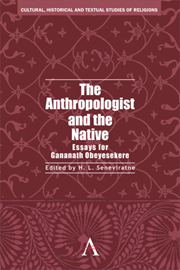Book contents
- Frontmatter
- Contents
- Editor's Note
- The Anthropologist and the Native: Essays for Gananath Obeyesekere
- SECTION I THE INDIAN TRADITION AND ITS REPRESENTATION
- SECTION II CASTE, KINSHIP, LAND AND COMMUNITY
- SECTION III RENUNCIATION AND POWER
- SECTION IV BUDDHISM TRANSFORMED
- SECTION V THE ENIGMA OF THE TEXT
- The Mythology of the Kāmasūtra
- Mandārampura Puvata: An Apocryphal Buddhist Chronicle
- Variants as Historical Statements: The Rāma-kathā in Early India
- SECTION VI THE ANTHROPOLOGIST AND THE NATIVE
- List of Contributors
Variants as Historical Statements: The Rāma-kathā in Early India
from SECTION V - THE ENIGMA OF THE TEXT
Published online by Cambridge University Press: 05 May 2012
- Frontmatter
- Contents
- Editor's Note
- The Anthropologist and the Native: Essays for Gananath Obeyesekere
- SECTION I THE INDIAN TRADITION AND ITS REPRESENTATION
- SECTION II CASTE, KINSHIP, LAND AND COMMUNITY
- SECTION III RENUNCIATION AND POWER
- SECTION IV BUDDHISM TRANSFORMED
- SECTION V THE ENIGMA OF THE TEXT
- The Mythology of the Kāmasūtra
- Mandārampura Puvata: An Apocryphal Buddhist Chronicle
- Variants as Historical Statements: The Rāma-kathā in Early India
- SECTION VI THE ANTHROPOLOGIST AND THE NATIVE
- List of Contributors
Summary
1. It has long been known that the Rāma-kathā —the story of Rāma— has been narrated in variant versions. The variants have been seen as each imprinted by the particular religious traditions which had appropriated the narrative. I would like to argue that since they are composed at different time periods and in different historical contexts they reflect varying perspectives of the past which gives them a place in the historical tradition. The three versions to be discussed here are parallel stories emanating from what might have been an original Rāma-kathā with inputs from other perspectives. They all have links to the epic genre. The first is the Dasaratha Jātaka from the Buddhist tradition which is either just prior to or contemporary with the second, the Rāmāyana of Vālmīki; and the third, later in date, is the Jaina version of the story, the Paumacariyam of Vimalasūri which contests the Vālmīki version and claims historicity.
Irrespective of when the earliest oral tradition was current, these three versions were by the early half of the first millennium AD familiar to various audiences. These variant versions are significant for the statements they make at particular historical moments and the similarities and differences between them. Such variants are prolific in Indian history. The three selected here reflect the consciousness of their historical moments and implicit in that, their perception of the past. Therefore, apart from the religious identity of each they also reflect other concerns pertaining to a historical tradition.
- Type
- Chapter
- Information
- The Anthropologist and the NativeEssays for Gananath Obeyesekere, pp. 349 - 394Publisher: Anthem PressPrint publication year: 2011



